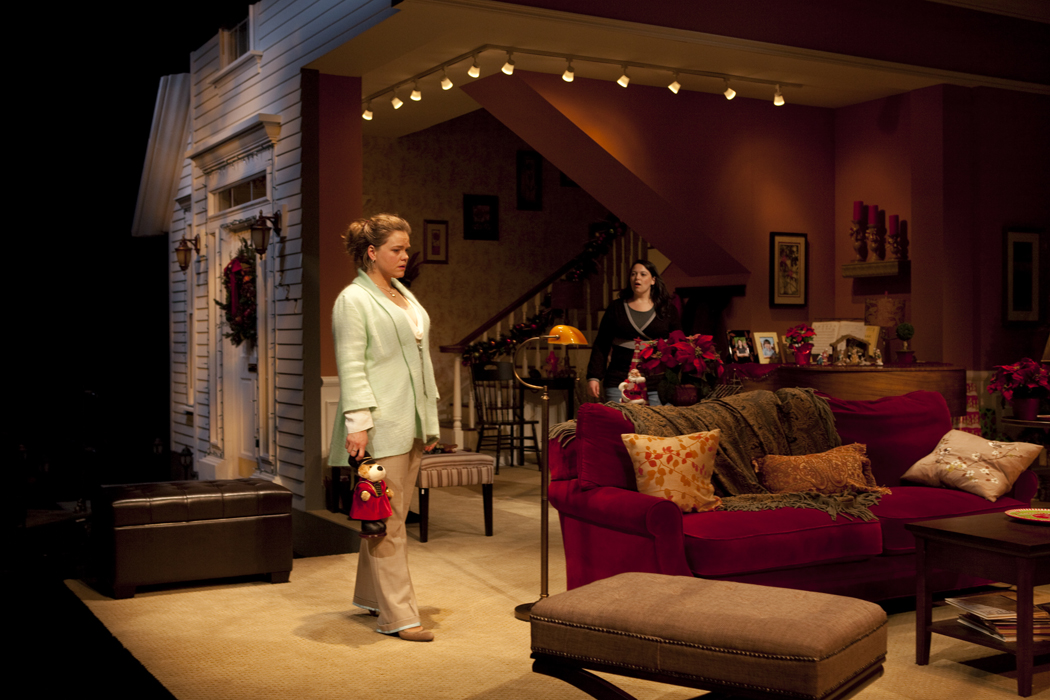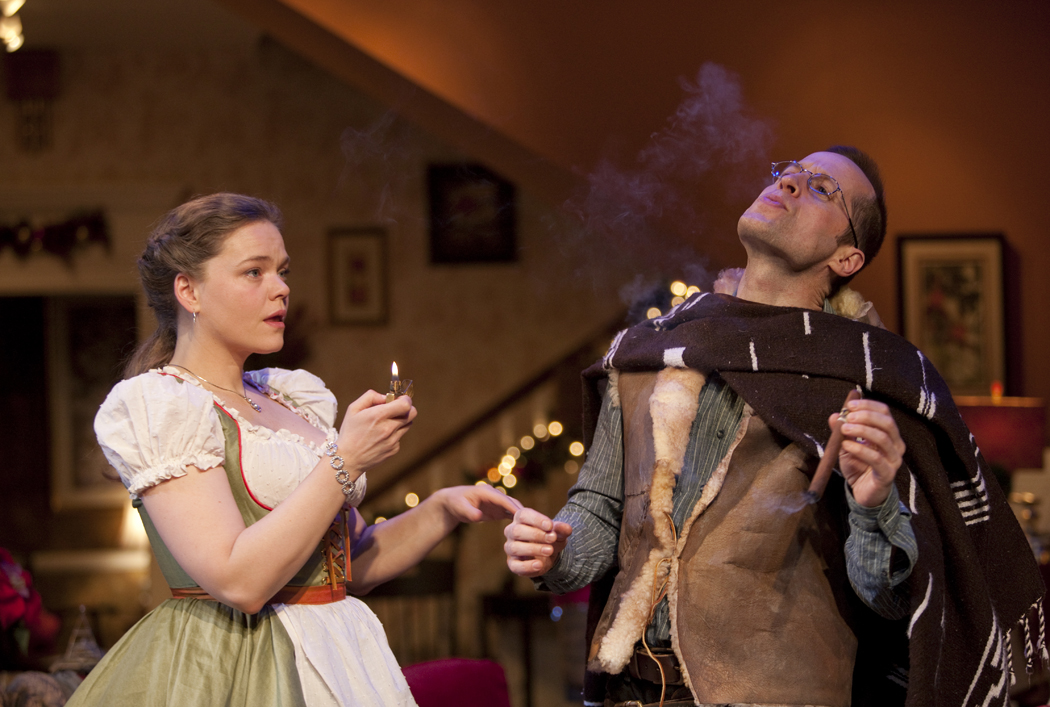Review of Our Town at Long Wharf Theatre

A lasting impression made by the current production of Thornton Wilder’s Our Town, directed by Gordon Edelstein, at the Long Wharf is the sheer size of the cast. With 21 speaking roles fleshed-out with at least 13 local extras, Edelstein marshals crowd scenes that indeed look like a town. This Our Town is based on the ideal of community as people who share a location and a way of life, such as those who have sustained the Long Wharf Theatre for 50 years in the same location.
As the Stage Manager, Myra Lucretia Taylor has the cadence of natural speech, and comes across like a friendly tour guide and a familiar presence—like a neighbor, in short. She’s proud of her town but she’s not blinded to its lack of excitement, nor is she apologetic. The tone of her narration and asides comes into focus when she states that a time capsule is being put together to be imbedded in a foundation, and says she wants a copy of “this play” to be included. The play we’re watching has the ambition to be “representative”—to tell, to the ages, what it was like, then and there. Early twentieth-century in Grover’s Corners, New Hampshire. But is that really still an “Anytown, U.S.A.”?

Perhaps not, but Edelstein’s decision to cast the play “color blind,” means that the demographic of Grover’s Corners has shifted rather radically from the all-white enclave Wilder doubtless envisioned. We might be surprised that, in the listing of local places of worship, there’s no mention of a synagogue, but that just goes to show how segregated by geography much of the U.S. was. Not so much now, and that’s what makes Our Town risk seeming more of a “quaint” history lesson than it should be. Notice how only “the Polish” are given their own “town” within Our Town—an immediate indication of where the play occurs within the waves of immigration to the States and migration to the north. Of course, all this is deliberate by Wilder who wants to depict Yankee rectitude and its long-standing ties to a place where, as we’re told, the indigenous population—Cotahatchee tribes—has long since disappeared, but for genetic material carried by “maybe three families.”
Ethnic diversity—this production makes clear—is something that we can’t help notice, whether as presence or absence, and that may be the strongest message in the Long Wharf’s Our Town. If we still want Grover’s Corners to represent us, as a generalized, idealized image of the U.S. small town, for that time capsule, then we have to alter Wilder’s vision willfully and adapt the image, and that’s what Edelstein’s production does. A truly “post-racial” U.S. won’t think of the couples before us on stage as “mixed.” We’re not there yet, and that’s one of the strongest arguments for Edelstein’s approach: his Our Town says something about where we, as a nation, were in Wilder’s time and where we are now.

And that is very much Wilder’s intention: to look at the local fauna sub specie aeternitatis, to see how the customs of any given time look pretty paltry when looked at from eternity. That’s a big call and the play’s wherewithal to do so is what keeps us in the grip of Our Town to the end. And we note the little touches that keep prodding us toward realizations about what is generally called “the human condition”—which, the Stage Manager would probably say, is just a grand way of saying “how folks live.” Her mention of scenery—“for those who feel there should be scenery”—highlights the stripped down nature of this make believe, so that we’re free to imagine the town, especially in the early going when the rhythms of the town’s “day in the life” are the main concern.
Later, there’s a wedding that looks like the kind of non-denominational ceremonies we meet with more often these days, and finally, in the most affecting segment, Act 3, the rendition of a graveyard subtly mirrors us—the audience—to ourselves. We’re all people in chairs staring straight ahead, very much inside the moment out of time Wilder’s play strives for. Death looks like a Town Hall meeting, and there’s a certain human comedy to seeing Joe Stoddard (James Andreassi) and Mateo Gomez (Sam Craig) as undertaker and mourner stumbling about among “the graves.” Wilder wants to show us how simple and likeable people are when trying to grasp the ungraspable. And it’s only in Act 3 that the play really becomes the story of Emily (Jenny Leona) whose awed grasp of what it means to be alive and to no longer be alive moves the play’s tone—as it must—beyond the tragic to the cosmic.

Along the way, there are many nicely done moments to enjoy: the gentle fun at the expense of the pedantic Professor Willard (Steve Routman) and Taylor’s curt nod when the Prof describes the racial make-up of the majority; the McMillan twins as what comes to seem the Crowells’ monopoly on paper delivery in the town; Don Sparks giving Doc Gibbs some Jimmy Stewart inflections, adding a touch of the Capraesque; Leon Addison Brown, as Editor Webb, fielding questions from the audience with the folkiness of a fireside chat; Linda Powell delivering Mrs. Gibbs’ unsentimental view from beyond the grave; Christina Rouner’s harried Mrs. Webb, who tells us rather breathlessly that she didn’t know how to prepare her daughter for her wedding night—something elders in the audience may still recall—and lets us know that weddings are horrible; Rey Lucas as George Gibbs, flashing a winning smile back at the Stage Manager after he woos Emily, having admitted he’d rather stay in Grover’s Corners for her sake than go off to college, and the well-played silent comedy before his uneasy chat with his soon-to-be father-in-law; Jenny Leona is a fresh and blonde Emily, the town’s golden girl whose tragedy—if you like—is that she hasn’t a thought to do anything, barely out of high school, but marry a teenage boy and add to the town’s population. Indeed, the mothers in the play—Mrs. Gibbs and Mrs. Webb—keep before us the almost endless domestic activity that was simply the way of things back before anyone had even invented the term “household drudgery.” Leona gives us an Emily sharper than George, who Lucas plays with much more charm than smarts, but who is smart enough to know he can’t do any better. Ethnic diversity may have come to Grover’s Corners; feminism still seems a long way off.

Wilder’s important breakthrough in Our Town is setting naturalistic action in a context that foregrounds the playacting, a technique—which the Long Wharf production keeps firmly in view—that should reveal to us how much of our own lives are just that. We are players who strut and fret upon the stage of our town, wherever that happens to be, just like the players in Our Town. If the point of theater is, as Hamlet says, to hold as 'twere the mirror up to nature, then the Long Wharf’s Our Town fully achieves that purpose. You may leave the play wondering what you’ve done with your life.
Our Town
By Thornton Wilder
Directed by Gordon Edelstein
Set Design: Eugene Lee; Costume Design: Emily Rebholz; Lighting Design: James F. Ingalls; Sound Design/Composer: John Gromada; Production Stage Manager: Hope Rose Kelly; Assistant Stage Manager: Amy Patricia Stern; Assistant Stage Manager: Michelle Lauren Tuite; Casting: Calleri Casting; Photos: T. Charles Erickson
Long Wharf Theatre
October 8-November 2, 2014







 The Long Wharf Theatre production of Henrik Ibsen's A Doll's House managed a surprising feat: it made the play more entertaining without significantly altering it. If you're a purist who wants to see Ibsen played straight, it does that; but if you think that a play like ADH, with its winsome wifey who gets into some hot water due to an "innocent" forgery, then gets out of it only to slam the door on her happy-ever-after home, is a bit dated and could use some kind of make-over, well, this show does that too.
The Long Wharf Theatre production of Henrik Ibsen's A Doll's House managed a surprising feat: it made the play more entertaining without significantly altering it. If you're a purist who wants to see Ibsen played straight, it does that; but if you think that a play like ADH, with its winsome wifey who gets into some hot water due to an "innocent" forgery, then gets out of it only to slam the door on her happy-ever-after home, is a bit dated and could use some kind of make-over, well, this show does that too.